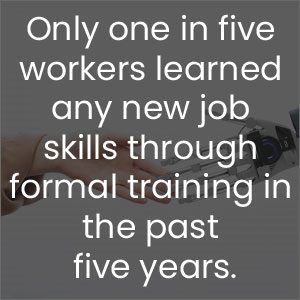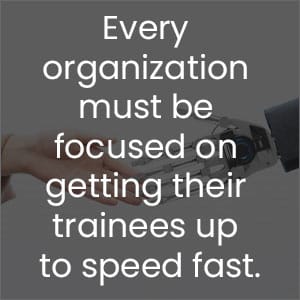“Learning to work with Intelligent Machines” in the Sep-Oct 2019 edition of Harvard Business Review (HBR) made me think about its application to the world of corporate contracts. We are entering a whole new world in risk management, the rise of block-chain technology, intelligent contracts, and artificial intelligence (AI) for contract management. Law firms and corporate legal practices have evolved more gradually, but we are at a momentous time of change. The question I took from the article was simple: how well does Matt Beane’s HBR article apply to intelligent contract machines – like ContractPodAi’s AI-enhanced contract lifecycle management (CLM)?
CONTRACT-BASED LEARNING
Beane points out that on-the-job learning (OJL) is taken for granted by companies. Even though $366 Billion was spent on training in 2018, very little addressed OJL. Sadly, an Accenture survey in 2011 shows that “only one in five workers learned any new job skills through formal training in the past five years.”
In essence, contract-based learning tactical skills will happen in the field within your own organization. The contract management process, methods to reduce risks, high-level overviews of your contracts and even reviews of traditional contracts will take place within the boundaries of your own departments.
WHERE WE DEVIATE
HBR’s article takes a deeper look at the obstacles to learning. This is where I feel the due diligence world of managing contracts diverges from the examples in the article.Only one in five workers learned any new job skills through formal training in the past five years.
TRAINEES MOVED AWAY FROM THE “LEARNING EDGE”
There are many benefits to AI technology and machine learning. One potential unexpected consequence is that trainees are taken away from the action – where they would learn the most. This argument is taken from the medical field. Since novices learn slowly and make mistakes, intelligent machines can manage the trainee by reducing their participation in the risky and complex parts of the work. It is only when the AI engine takes over that the new doctor shows signs of errors. However, it is this edge of one’s capabilities and knowledge that we can term the learning edge. This is what’s most important for new trainees.
Intelligent contract machines aren’t quite like this. Rather than taking away the learning edge, AI-enhanced contract management software increases the value of the learning edge. In our case, intelligent machines in contract management takes on the tedious, monotonous, and less inspiring work. Tedious low-level jobs, like reading through droves of contracts, to extract financials, key obligations, important dates, triggers, and expiration timelines – are done by the AI engine.
CLOSER TO THE “HV LEARNING EDGE”
Rather than thinking about the learning edge as a single boundary, we need to think of it as multiple boundaries. There are low value and higher value learning edges. Learning to tie a bow tie is an interesting learning edge. But, I would argue that it is not a particularly high value (HV) learning edge unless you are a concierge at a very high-end classic restaurant.
My point is that intelligent (AI) contract machines improve contract management. In other words, the agreements management system intelligence takes away the tedium. This means a trainee can focus on how to use the AI tools. More importantly, they can now focus on the high value of interpreting, analyzing and using the results rather than spending their time searching for them.
In our case, intelligent contract machines elevate the trainee’s game. It means the organization is getting higher value results from its new resources, faster.
LEARNERS: MASTERING OLD & NEW METHODS
Every organization must be focused on getting their trainees up to speed fast. Again, the HBR article provides an interesting perspective here. It calls out the fact that most organizations require new resources to learn both old and new methodologies. That being both the old manual way of doing things and then how it is done now with the machine intelligence system. It creates the age-old problem of being the ‘jack of all trades, yet master of none.’ The article cites this as ‘methodological overload.’
We need to question why we are learning the old methods. After all, you don’t learn to drive a car by first learning to drive a horse and buggy. It may add to the overall experience. But, it certainly is not a necessity.
On methodological overload, is there a need and good reason for it anymore? Using intelligent contract machines like ContractPodAi’s full lifecycle management solution – takes away the need for learning through tedium. The pre-trained AI engine does much of the brute force and tedious work for the General Counsel. The new associate general counsel or contract manager doesn’t have to learn how to look through 325 contracts searching for outlier liability limits. Instead, learn to use the tools available to elevate the role and results.
FRIEND OR FOE?
At the end of the day, every organization must focus on getting their trainees up to speed fast. More importantly, it is about getting ‘up to speed’ on the right techniques, practices, and technologies that are going to be most valuable to the organization. Instead of perceiving intelligent contract machines as ‘the enemy’ which takes away on-the-job learning opportunities; leverage its strengths. Use it to ‘up your own game’. Don’t get stuck expecting trainees to be both practiced in old-world methods, as well as the new. Leave the old world to the historians – we have productive businesses to run now. Intelligent contract machines are here to help us achieve more – faster and at lower costs. They are DEFINITELY our friend!
INTELLIGENT CONTRACT MACHINES: LEARN MORE
To learn more about these exciting new developments in contract management – reach out. Contact us for a pressure-free discussion about the latest and most advanced contract technology in the world. As a corporate general counsel or contract manager – find out how ContractPodAi can help elevate your game.
Author:

Sarvarth Misra
Connect with us on Linkedin





